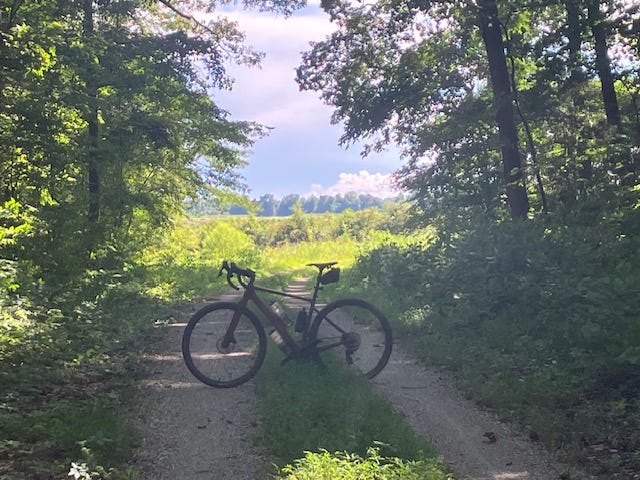The Law of Unintended Consequences
Alligators, Kudzu, and Life Choices
When the American alligator was placed on the Endangered Species list in the 1970s, the Fish and Wildlife Department moved 56 alligators from Louisiana to the Wheeler Wildlife Refuge in North Alabama in 1979. By expanding the alligator’s range, officials hoped to prevent its extinction. One of the selling features of the move was that the alligators would help control the beaver population in Wheeler that was destroying swaths of forest. In 1979, Wheeler Wildlife Refuge was surrounded by private rural forests and farmland, so alligator interaction with humans was not expected to be an issue. Some even thought that the winters would be too cold for the alligators to reproduce.
46 years later, this part of the world has some of the hottest real estate in the country. Neighborhoods are replacing the farmlands and forests as civilization closes in on Wheeler Wildlife Refuge. I ride my bike a couple times a week from my house to cycle the scenic gravel roads of Wheeler, just three miles from my front door. At the same time, the alligators (who found a way to reproduce after all) are wandering off the Refuge into nearby neighborhoods. What could possibly go wrong?
[Photo credit: Anya Adams, at Lady Ann Lake, Zierdt Road, Madison County, Alabama]
Perhaps the solution is as simple as putting a fence around your yard, your pets, and your small children. Take a look at this video and think again:
The Law of Unintended Consequences
The Law of Unintended Consequences says “that actions of people, and especially of governments, always have effects that are unanticipated or ‘unintended.’” Sometimes the effects are positive but often they’re not. An action taken with the best of intentions can produce unforeseen and unwelcome results. For example, another thing you’ll see in Wheeler Refuge, and all over the South, is kudzu.
Kudzu is an invasive plant species that was brought here from Japan in 1876 during the Philadelphia Centennial Exposition. It quickly became a popular ornamental plant in the southern United States, and soon it was promoted as a good tool for controlling erosion and providing forage for cattle. The rest, as they say, is history. Good intentions resulted in an out-of-control, tree-suffocating, weed-gone-wild.
God Can See What We Can’t
Of course, the unintended consequences of relocating gators and kudzu aren’t on the long list of Biblical warnings. But there are warnings in the Bible that might bewilder us because they seem counterintuitive. Our limited foresight might lead us to think, “But what’s the harm in that?”
A good overarching principle to keep in mind is in Proverbs 16:25: “There is a way that seems right to a man, but its end is the way to death.” That’s why man, throughout history, has made countless costly decisions that in retrospect seem utterly stupid. Speaking of kudzu, how about Hitler? Appeasing and praising expansionist war-hungry liars and murders when it’s in your power to restrain and contain them should never seem like good policy after World War II. But I digress.
There are two examples in the first century church of Thessalonica to consider.
Unintended Economic Consequences
Paul tells the Thessalonians to “keep away from any brother who is walking in idleness,” able bodied but unwilling to work. In fact, “if he’s not willing to work, let him not eat (2 Thess. 3:10).” That is, if a church member refuses to work and expects others to give him money, the church is not responsible to feed him, no matter how hungry he gets. His hunger is his best incentive to get to work.
So Paul tells the church, in this case, not to feed the hungry. That kind of tough love may seem counterintuitive to Christ-followers who want to obey his command to love our neighbor, but creating and maintaining unhealthy financial dependence is not really loving. It has the unintended consequence of prolonging poverty, perhaps into subsequent generations. An act prompted by love (generous unconditional giving) may be the most unloving thing you can do.
That doesn’t mean we give up on the idle. In fact, Paul says we should “be patient” with them (1 Thess. 2:18). It takes more time and effort to work with a poor person who has an idleness problem and bring them to fruitful repentance than it does to just give them money. Giving them money may be an easy way to ease our conscience, but it’s probably not helping anyone very much.
I’m not smart enough to tell you how to fix our nation’s welfare program, but there’s wide agreement that it needs reform. If you’re interested, here’s a good piece explaining why expensive guaranteed income programs don’t really do much good in the long run. In fact, they create unhealthy dependency and contribute to the epidemic of fatherlessness in our nation.
But while our nation’s trillion-dollar issues are out of my league, as a Christian I am duty-bound to help the church to “remember the poor” (Gal. 2:10) in ways that actually help the poor while avoiding those pesky unintended consequences.
Unintended Sexual Consequences
Another issue the Thessalonians faced was the culture of sexual promiscuity in the first century Roman Empire. Christ calls us to sexual purity, embracing the good gift of holy sex between a man and a woman united in marriage, while abstaining from unholy sex (everything else). Jesus has the right to tell us who we can sleep with and he forbids all sex before marriage, all sex outside of marriage, all sex with members of the same sex, and harboring lustful thoughts of unholy sex. Paul couldn’t be clearer when he said “For this is the will of God, your sanctification: that you abstain from sexual immorality” (1 Th. 4:3).
The phrase “sexual immorality” translates the Greek word, porneia.
So No, you can’t sleep with your girlfriend, even if you “love” her. And No, you can’t marry someone of the same sex, even if you’re attracted to them. And No, you can’t have an affair with that interesting person at the office. And No, you can’t innocently dabble in pornography, even if you think “it isn’t hurting anyone.”
All those “No’s” may sound unloving, but the problem is that it is hurting someone. All sexual sin hurts people. It harms the sinner and every person the sinner involves in his or her sin. It spreads physical disease, spiritual alienation, and relational carnage. It destroys the society-stabilizing institution of marriage, promotes divorce, devastates children, creates the conditions that demand abortion, and promotes fatherlessness along with its attendant poverty, crime, abuse, depression, and suicide.
Yet people will justify their sexual sin by claiming it is loving, ignoring that “there is a way that seems right to a man, but its end is the way to death.”
Consequences Delayed Are Not Consequences Denied
A few years ago, weed killer was mistakenly sprayed on a high school football field in the Chicago area instead of fertilizer. I’m sure the groundskeeper was filled with good intentions that day and what he did seemed right at the time. I’m also sure that the next day, the grass was still green. And the next. Systemic herbicide takes some time to do its job, but when it does the job, it’s thorough.
The consequences of financial and sexual decisions may not be seen in a day (though they might). It may take 45 years for the alligators to invade your neighborhoods. It may take a decade before the kudzu swallows the loblolly pine. But time will tell. Financial and sexual foolishness may seem right and wise and pleasant in the beginning. But if God has told us no, it’s because he can see what we can’t: the unintended consequences of what you think would be a great idea.




After a day of swimming and fishing in Flint Creek my buddies and I saw a 7’ consequence on a sandbar sometime around the mid 80’s. It took years and a government confession before anyone believed me.
Truth never changes nor is it altered!! How applicable is the truth God gave the Thessalonians to our society today!!
Thanks for always pointing out the truth, Steve!!